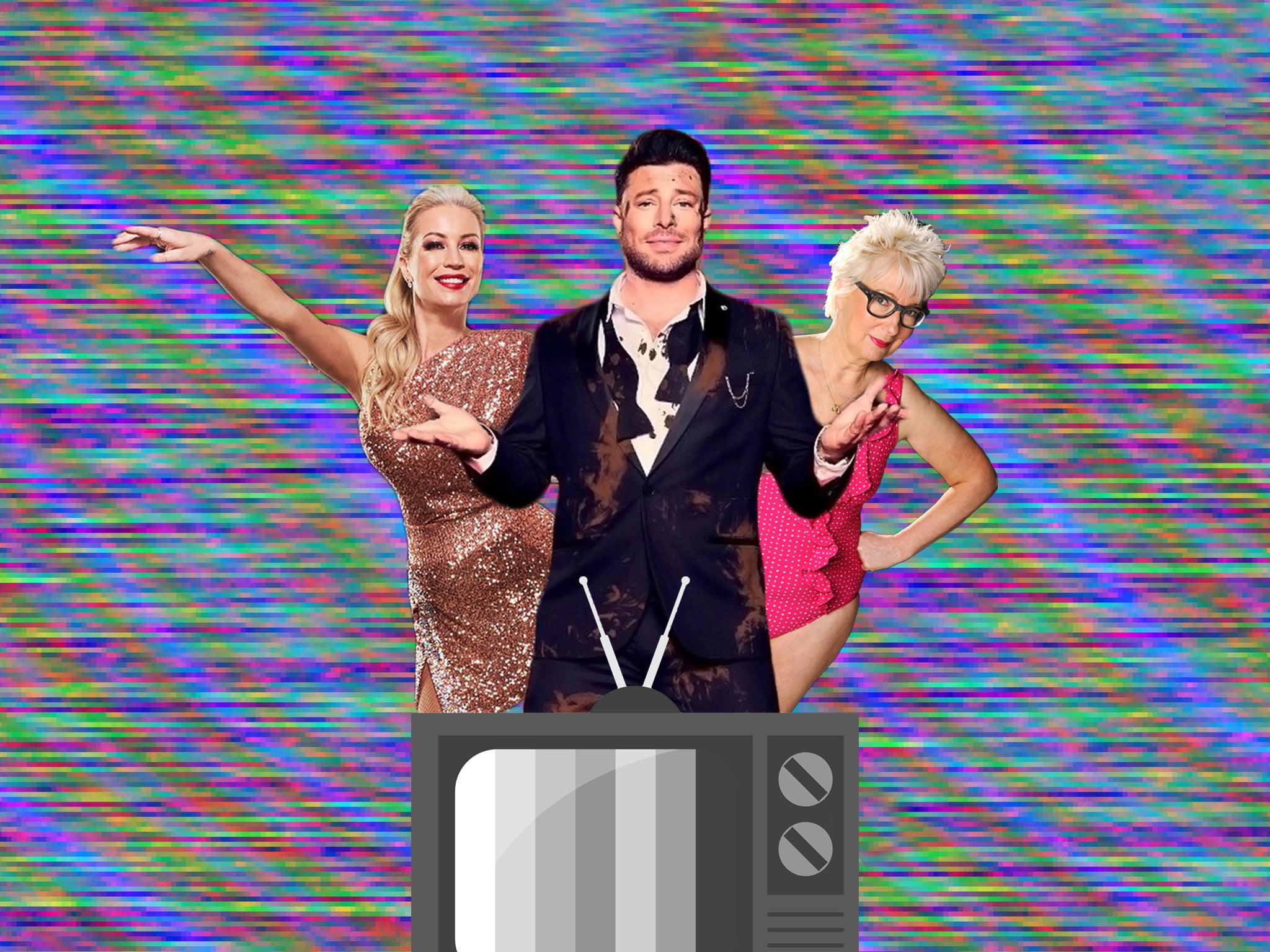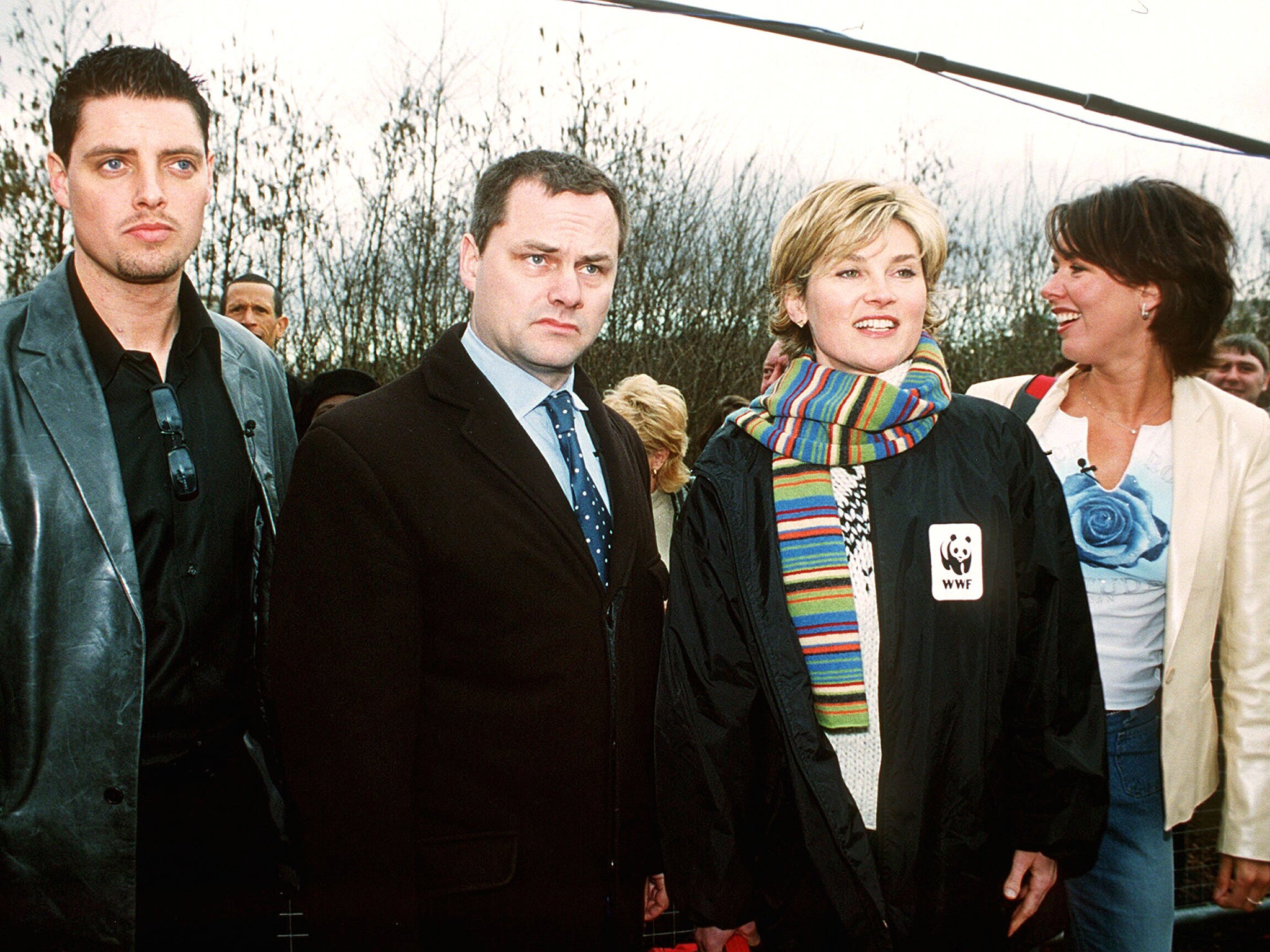‘The Masked Singer got me my record deal’: How celebrities took over reality TV and won
Even before the pandemic, reality television had transformed from an artistic bugbear to a vital source of revenue, publicity and personal development for some of the UK’s most recognisable faces. Denise van Outen, Duncan James and Jenny Eclair tell Charlotte Manning why they’re so important

Your support helps us to tell the story
From reproductive rights to climate change to Big Tech, The Independent is on the ground when the story is developing. Whether it's investigating the financials of Elon Musk's pro-Trump PAC or producing our latest documentary, 'The A Word', which shines a light on the American women fighting for reproductive rights, we know how important it is to parse out the facts from the messaging.
At such a critical moment in US history, we need reporters on the ground. Your donation allows us to keep sending journalists to speak to both sides of the story.
The Independent is trusted by Americans across the entire political spectrum. And unlike many other quality news outlets, we choose not to lock Americans out of our reporting and analysis with paywalls. We believe quality journalism should be available to everyone, paid for by those who can afford it.
Your support makes all the difference.“If the phone goes and it’s a reality show, I’ll do it!” jokes comedian Jenny Eclair, whose credits include I’m a Celebrity..., Celebrity MasterChef and The Great Celebrity Bake Off. She compares any sneering around reality TV to stances she overheard at drama school. “There was a very snobby attitude that you never wanted to play the regions, that basically everybody should be aiming for the West End. I learned very quickly that all that was bollocks! If you want a long career in this game, you want to be looking at the whole smorgasbord of what’s on offer.”
And when it comes to reality television, there’s a lot of it. Increasingly so. Over the last 20 years, the genre has become a vital platform for celebrities eager to revive or enhance their careers. Whole shows – from Dancing on Ice to Celebrity Five Go Barging – are built around recognisable faces learning new and sometimes ludicrous skills, while a multitude of celebrity specials of traditionally non-celebrity programmes continue to be ratings hits, from All Star Mr & Mrs to Pointless Celebrities.
They’ve also never been more essential than during the pandemic. The arts industry has been brought to its knees by coronavirus, and the creative sector has struggled amid an undeniable lack of support from the government. For stars who may have had to put their tours, stage shows and acting work on hold, reality TV has been a balm. They can also lead to permanent changes in career trajectory.
“I’m not doing [them] for any kind of validation,” says Denise van Outen, recently seen on The Celebrity Circle and Dancing on Ice. “It does show a different side [to me], and also I feel like I work really hard.” She says her friends call her “the grafter”, because she’s always got such a packed work schedule. “I think I’m just a little bit of a daredevil as well. Most of my friends are all, ‘What’s she gonna do now?’”
She believes the direction of her career has sometimes been changed by appearing on such shows. “If I hadn’t done The Masked Singer, I would never have got an album deal,” she says. “I also think people can see [through The Celebrity Circle and Celebrity Gogglebox] that I’m very comfortable with just being on camera without makeup on. I’ve spent a large part of my career known as the Essex girl that’s always made up to the nines. [So to] actually see everything stripped back and [me] being myself, it shows that I’m a grown up – I’m a middle-aged mum now! You get to show that side of your personality.”
Read more:
The celebrity-reality boom kicked off in 2001. Channel 4’s Big Brother was one of the genre’s earliest adapters, with Jack Dee crowned the winner of a week-long celebrity season in aid of Comic Relief. The programme was such a success that it came back for a second series, which was won by Take That’s Mark Owen. In 2002, ITV struck gold with I’m a Celebrity..., while Strictly Come Dancing arrived two years later on the BBC. Both shows continue to sit near the top of their respective broadcasters’ annual ratings to this day. Such celebrity hits made it official: the British public were in love with watching stars present versions of their real selves on-screen.
“It’s a very simple psychological combination of voyeurism and aspiration,” says Pablo O’Hana, who works as a director of talent for the publicity agency Apostrophe Talent. “Reality TV allows us to look into the lives of ‘normal people’ and access their daily activities, and what we’re not typically privy to. Adding in the celebrity element only heightens that interest. You can, if you wish, watch your favourite soap star showering, gossiping and taking part in tasks. So the draw of being able to watch celebrities be ‘just like us’ is too good an experience to pass up.”
“We can see from our viewing figures that when it comes to reality TV, our customers particularly love celebrity series and celebrity specials,” says Freesat’s Alistair Thom. “Take Big Brother – in 2018 we saw the celebrity series launch show receive 34 per cent more viewers than the most-watched episode of the original format show that year.”
Streamline PR’s Joseph Hagan says that further career opportunities are a major factor in wooing recognisable faces to reality television. “Say there’s a reality show and you’re learning about music or singing or being a DJ or something like that,” he says. “Afterwards, we could start pursuing more DJ bookings for them because they’ve learned a new skill.”

Watch Apple TV+ free for 7 days
New subscribers only. £8.99/mo. after free trial. Plan auto-renews until cancelled

Watch Apple TV+ free for 7 days
New subscribers only. £8.99/mo. after free trial. Plan auto-renews until cancelled
Eclair credits reality television with providing a financial safety net, as well as providing work that she thinks she wouldn’t have got otherwise. “I’ve been working since I was 20,” she says. “Which is long enough to know that your career does have peaks and troughs, and sometimes a reality show comes along at trough-time. You think, a) this will pay my tax bill, and b) it might get some bums in seats on tour, or it might get people buying the next book. It’s all meshed up.”
She has a forthcoming tour, Sixty! (FFS!), scheduled for later this year, and has just presented her own TV series, Channel 4’s Drawers Off, for the very first time. “It was a joyful thing to get,” she says. “It was my first telly presenting gig really – at 60! And I don’t think I’d have got that if I hadn’t done Celebrity Bake Off. And I probably wouldn’t have got that if I hadn’t done all the reality shows I’d done before.”

Actor and singer Duncan James, who found fame in the pop group Blue, confesses that his participation in February’s Celebs on the Farm was less about learning a new skill, and more about his boredom during lockdown. “I was just, like, ‘Oh my God, anything to get me out the house!’” he jokes. “Normally I wouldn’t have the time to do something like that, but it was just nice to basically have some escapism from being at home – so I had two wonderful weeks in Scarborough!”
James has also appeared on The Celebrity Chase and, with Van Outen last month, The Celebrity Circle. But specific reality TV appearances hold special meaning to him. He says that his presence on a celebrity version of First Dates Hotel in 2019, which saw him go on a blind date in aid of Stand Up to Cancer, was “a big step” for him in terms of his sexuality. “I was really nervous about coming out and talking about dating guys and actually going on a date with a guy,” he remembers. “I’ve never shown that side of me. There’s a lot of vulnerability. If you’re not used to it, it’s quite a big deal, really. But I’ve actually enjoyed it. I think if you want to keep developing yourself as an artist or performer or a celebrity, whatever you want to call yourself, you have to be able to show that vulnerability.”
O’Hana says that reality TV often provides a platform for celebrity transformation. “A successful stint on a reality show can be exceptionally powerful for a celebrity wanting to introduce, present or reinvent themselves in the eyes and minds of the public,” he says. He cites Alex Reid, former husband of Katie Price, as one such star whose presence on a reality show completely shifted his image. “He was heavily booed and heckled as he went into the Celebrity Big Brother house [in 2010], and his odds of winning were set at 200/1,” he remembers. “Twenty-seven days later, he emerged as the winner with 66 per cent of the public vote. As an exercise in changing public perception and brand reinvention, it was a masterclass.”
A reality show comes along and you think, a) this will pay my tax bill, and b) it might get some bums in seats on my next tour
He is careful, though. “Viewers want to see participants of reality show warts and all, but you need to protect your talent from exposing too much,” he explains. “I have to assess each opportunity and weigh up whether it will harm them in the long term. There are plenty of examples of celebrities who have gone on to reality shows hoping it will turn their public perception around, and it’s gone horribly wrong.”
It’s true, but also relatively rare considering the volume of reality shows on the air. They can help stars get their careers back on track, boost their profiles, and introduce them to audiences composed of completely different demographics. When even the most obscure of celebrity reality shows can pull in high ratings, it seems like a no-brainer. So why does a certain snobbery about them still exist?
“Because it’s not highbrow entertainment,” Eclair suggests. “We’re trained to think that unless we’re improving ourselves, or if these shows aren’t more educational or more literary, it’s junk food. But I think a lot of the time people do need the occasional doughnut.”
Denise van Outen can be seen in the one-woman play Some Girl I Used to Know, which streams from 2 April until 5 April, with tickets found here. Jenny Eclair is touring Sixty! (FFS!) from September, while Duncan James appears in Cabaret All Stars from May.
Join our commenting forum
Join thought-provoking conversations, follow other Independent readers and see their replies
Comments